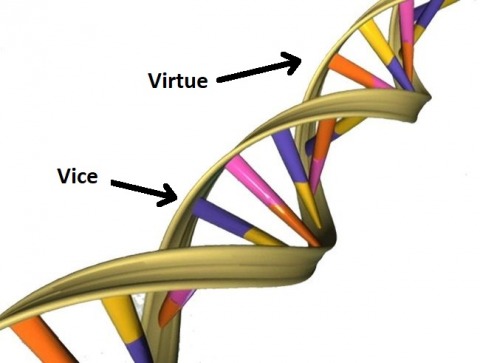
The Underground Thomist
Blog
Occupied Wall StreetMonday, 02-13-2023
It’s good to see the attention Victor Davis Hanson’s recent commentary “Anarchy, American Style” has been receiving, because most people have not yet caught up with the facts about our new elites. The Occupy Wall Street protesters a decade ago couldn’t have been more oblivious to the state of affairs they thought they were protesting, because Wall Street is already occupied. So are the other centers of power, such as Silicon Valley and Washington, D.C. Social revolutionaries aren’t found in fields and factories any more, but in mansions, town houses, and executive suites. You can’t imagine Mao Zedong in a three-piece suit and wearing Prada? Never mind. Just picture Mark Zuckerberg in a Che Guevara tee. I haven’t much to add to Hanson’s article, except that these are the glory days of smugness and self-admiration. Not that there is a lot of it, because there has always been a lot of it. Today, though, those who wish to pat themselves on the back no longer have to make a choice. In times gone by, the vain and the proud could either glory in self-serving power and privilege, or parade their supposed courage for upsetting the bad old status quo – never both. But now they are the very same people. They have done the impossible. They have squared the circle. They have finally found how to have their cake and eat it.
|
From the Mouths of ChildrenMonday, 02-06-2023
I thrived on the hymns of my Baptist church when I was small. My family was musical, and it seemed natural to listen to the counterpoint and sing in harmony. Thinking that I would love it, my mother put me in the children’s choir. To her great dismay, I rebelled and dropped out. It was unspeakably humiliating to me. I thought we were going to sing things like the Doxology, the way the grownup choir did: “Praise God from whom all blessings flow! Praise Him all creatures here below!” It was wonderful, and contained nothing too difficult for children. Instead we were taught “He’s got the itty bitty babies in his hands,” and I wanted to cringe. The choirmistress was put out with me. Didn’t I know that the great God had the itty bitty babies in his hands? I did know. I believed it fervently. But did we have to sound like itty bitty babies too? The girls seemed to be okay with this, but believe me, it is not the way to encourage boys to be devout. Adults give children the music they like to hear children sing – which can be, but is not necessarily, the music children would like to sing. Or else adults give children bad music to sing, on the assumption that children have no taste. Perhaps they teach them the music they considered jazzy and with-it long ago, when they were in their twenties; I’ll never forget when I heard a troupe of children dutifully singing the schlock praise lyrics, “Lord, you know where I’ve been.” One wondered: Where was that? Perhaps they were all on the rebound from their third marriages and recovering from hangovers. Or had they just been in the cookie jar? Still worse, these days children are often merely accompaniments to taped music. Nobody expects them to sing loudly enough to be heard on their own. And so, of course, they don’t. This is part of the reason why I found it so wonderful to hear two of my grandchildren, a boy and a girl, along with the rest of the new children’s choir at their parish. It was the choir’s first time out. They had been practicing for only weeks, but did they ever belt it out. They did all the liturgical music for the whole Mass, and they did it right. It was wonderful to see their glowing faces. They were getting to do what the grownups did. They were doing it tunefully, reverently, and well. They were serving God. And they loved it. People of different ages need different reminders. When I was a young man, impious, arrogant, full of myself, I needed to hear “unless you turn and become like children, you will never enter the kingdom of heaven.” But when I was eight, desperate to grow up, what I needed to hear was “attain to mature manhood, to the measure of the stature of the fulness of Christ.”
|
A Genetic Hack for Virtue?Monday, 01-30-2023
** Spoiler Alert ** I recently read Upgrade, a Michael Crichton-style technothriller by Blake Crouch, in which humanity almost comes to an end because someone decides to play God, trying to implement an involuntary, virally transmitted polygenetic hack in order to make the whole human race smarter. What could go wrong? A lot. The first few supergeniuses try to kill each other. The novel is a decent read, and to his credit, Crouch realizes that we don't have an intelligence problem, but a moral problem. Unfortunately, as the plot moves along, he reaches the wrong conclusion: We just need to play God better. For in his view, we do need a genetic hack -- not to upgrade intelligence, but to feel more compassion. What could go wrong? A novel shouldn’t be treated as an ethics treatise, but novels often encapsulate widespread errors. So here, for we do need compassion, but compassion is a virtue. Crouch falls into the sentimentalist fallacy. He thinks it’s a feeling. Virtuous people don’t just feel more of something. The good man feels the right things, for the right reasons, toward the right people, on the right occasions, to the right degree. Feeling so much sympathy that I am unable to punish the convicted mass murderer doesn’t make me compassionate; it makes me a ninny. We need judgment. So even though virtue is habitual, it can’t be programmed – and anything that can be programmed isn’t virtue. Conceivably, a genetic hack might make people have some feelings more intensely. What it can't do is make them more virtuous. It may even make them less.
|
Were They Snowflakes, or Situationalists?Monday, 01-23-2023
This is about being mean. Let me explain. Supreme Court Justices sometimes pose questions about hypothetical situations during oral arguments. Of course, a court does not have the same degree of license to consider hypotheticals in settling a case that a legislature has to consider them in making a law. Still, jurists have to pose some hypothetical questions in order to discern what kind of precedent they are being asked to set. Would they be able to live with it in the future? Carson v. Makin, a case decided in summer 2022, concerned whether a state which offered private school tuition assistance to some parents could deny it to parents who chose private religious schools. After several of the other Justices expressed fears that religious schools are divisive, Justice Thomas posed the following hypothetical question. Well suppose that a school is affiliated with a religious group and they say, “We do infuse our religious beliefs into all aspects of the community, but our salient religious beliefs are that all people are created equal and that nobody should be subjected to any form of invidious discrimination, and that everybody is worthy of respect and should be treated with dignity, and that everybody has an obligation to make contributions to the community and engage in charitable work. Those are our religious beliefs. And we don’t really have any dogma, but these are principles that we think our students should keep in mind consistent with the religious outlook of our community.” Would that school be disqualified? It was a shrewd question. A “Yes” answer would show that fear of divisiveness was a smokescreen – that the state was simply hostile to religion. A “No” answer would show that the state was not hostile to religion, but only to certain religions, on the basis of what they believed. The attorney who was defending the state was clearly uncomfortable. He squirmed. He said that it would be an interesting problem if it ever came up, but that it hadn’t come up. When I had my students read the oral arguments, I thought that they would be annoyed with the attorney for his evasiveness. Answer the question! Some were, but a fair number had the opposite reaction. They thought that just by posing the question in the first place, Justice Thomas was “badgering” the attorney -- that he was being mean to him. Their hostility to hypothetical questions surprised me. What else is one supposed to do in oral arguments? I’ve considered two possible explanations their reaction. No doubt there are others, but these are the two that seem plausible. The first possibility: The snowflake syndrome. As you may have heard, quite a few students these days are extremely uncomfortable with hard, fair give and take. I suppose this kind of conversation is an acquired taste. It used to be acquired in the course of education, but we hardly educate any more. Consequently, these students view being questioned as being “judged,” and they want everyone to hold hands and play nice. This insistence on niceness – as they define niceness -- is pretty exclusionary. It has the rather awful consequence that whatever the dominant view may be, it cannot be challenged. Perhaps, then, the students who were hostile to Justice Thomas’s line of inquiry were reacting along snowflake lines. Justice Thomas’s challenging questions may have seemed “threatening” to them. They might have thought he was practicing “microaggression.” But I don’t think that was it. I lean more toward the second possibility: Situationalism. Perhaps the students who viewed hypothetical questions as “badgering” simply didn’t believe in universal rules. To explain: Ordinarily we say that relevantly similar cases should be treated the same way. If we say “Don’t kill that man – it’s murder, because it’s a deliberate taking of innocent human life,” we are saying that we shouldn’t just hold back from killing that man – we should hold back from any act which fulfills the criteria of murder. Naturally, if you believe in treating relevantly similar cases the same way, you will find that hypothetical questions can often be helpful. I don’t mean silly ones, like “What if the teachers in that school were Martians?” or “What if the students were brains in a vat?” I mean reasonable ones, like “What if the school was associated with a religion which taught Q?”, when there are, in fact, religions which teach Q. But situationalists believe that there are no relevantly similar cases. Every situation is unique. Therefore, when we decide what to do in this situation, what we might do in other situations is irrelevant; to decide is just to decide. All we have to go on is the seat of our pants. In this view, it isn’t just that some rules have exceptions. It’s that all rules have exceptions -- so many exceptions that there is no point in having rules. Of course we could try to do without rules. We could abolish laws and have only judges, sages who decide each case in complete isolation from every other case. The Western tradition has wisely rejected this path. We proclaim “the rule of law, not the rule of men.” Another way to say it is that our tradition is not situationalist – and that not being situationalist is a very good thing. Being a snowflake is a character trait. Believing in situationalism is a philosophical position. I wonder, though, whether there is a relation between them. Snowflakes may be predisposed to believe in situationalism. Situationalists may have a hard time not acting like snowflakes, because the expectation of consistency will seem so unreasonable to them.
|
Politics and Language, RevisitedMonday, 01-16-2023
Roe may have been overturned, but abortion is still with us, and language is endlessly manipulable. In homage to George Orwell, here are a few more words, phrases, and idioms for the Newspeak Dictionary. The long-delayed Eleventh Edition is still in preparation. Reproductive rights. One would think a reproductive right protected the ability to have a child whom other people didn’t want you to have. However, abortion is about being able to do away with a child that other people want to save. Properly speaking, it is an anti-reproductive right. The expression “reproductive rights” is a way to support killing babies, and yet get the good vibes associated with having them. Pro-choice. Abortion is pro-choice in the same sense that the antebellum politicians who wanted the states to be able to allow slavery were pro-choice. It is “pro” a particular choice by particular people. The slave had no choice about enslavement; neither did the people who wanted to free him. The baby has no choice about abortion; neither do the people who want to save him. It’s my body. The Romans used to say something like this too. A father could kill his children at any age because they were considered parts or extensions of his body. Of course, children are parts of us in the sense that we cannot separate our well-being from theirs – but they are not parts of us in the material sense, like fingernails we throw away. Biologically the baby is not a part of the woman’s body, but a separate individual inside her body, entrusted to the closest of all possible care. It's not my business. Pontius Pilate said something similar when he washed his hands before the crowd and said “I am innocent of the blood of this innocent man.” He meant “Don’t blame me – I’m not killing Him – I’m only giving other people the authority to kill him.” We make the same excuse when we authorize abortion. I’m not going to tell anyone else what to do. True, we shouldn’t butt into other people’s personal business. But killing other people isn’t anyone’s personal business, and stopping them from doing so isn’t butting in. By the way, would you say “I’m not going to tell anyone else what to do” if the question were whether parents may kill their newborns? I hope you wouldn’t. But did you know that some people do? In medical ethics, the latest euphemism for infanticide is “after-birth abortion.”
|
Responses to “Sympathy for Stanford”Thursday, 01-12-2023
Though I appreciate responses to the blog, I don’t usually post them. Here, though, are just a few especially intriguing ones to “Sympathy for Stanford.” The first: At the school where my friend teaches, matters have become very extreme. By his report, the latest is that teachers are not allowed to praise students for good work, because the students might find praise “threatening.” The second is from a Latin American friend: People seem to be going crazy in your country's universities. I just wanted to comment on a minor point. Hearing the term “American” used to describe people from the USA, some Latin Americans do lash out, saying "America is the continent not their country" or "they don't own the whole place," whether for reasons of envy or of just remembrance of past grievances. They propose alternatives, like "Estadounidense" (which means something like "Unitedstater") or "North American." Now these two terms also have problems. “Estadounidense” cannot be translated elegantly into English; besides, Mexico is also the United States (the United Mexican States). “North American” could apply to Canada and Mexico. I just use the word American, because it is in the name -- like people call Mexicans, Mexicans. Stanford is using a double standard, because not only in common parlance but in the press, my countrymen and I call Americans by a great variety of names, some of them not very flattering. We use the word “gringo” 24/7, and no one calls us out.
|
Sympathy for StanfordMonday, 01-09-2023
Stanford University hit the news recently for its Elimination of Harmful Language Initiative, a thirteen-page document listing offensive words and idioms that ought to be avoided. All right-thinking people will be grateful to those who compiled the list, because insensitive language is everywhere. For example, did you know that it’s offensive to describe U.S. citizens as “Americans”? I sure didn’t. As Stanford helpfully explains, this term demeans all the other countries that make up the Americas. Who would have known? After criticism from dimwits and Neanderthals -- excuse me, from wit-impaired persons and distant human relatives -- Stanford locked the document to keep unauthorized persons from reading it. Fortunately, you can still see it here. In the spirit of Stanford’s bold initiative, I’ve tried my hand at devising an index of forbidden words and idioms for proposal to my own university. Composing a language ban may seem easy, but let me tell you, this sort of thing is much more difficult to do than you might think. I have far greater sympathy and respect for Diversity, Equity, and Inclusion (DEI) administrators at places like Stanford than I did before. The task of purifying language is so challenging that it might be better to stop using words altogether. To mention but a single category of forbidden words, Stanford’s thirteen-page index prohibits terms that define people by just one of their characteristics. “Prisoner,” for example, defines people by the characteristic of being, or having been, in prison. Instead, Stanford says, one should say “person who is/was incarcerated.” My first, uncharitable thought was that Stanford’s DEI experts hadn’t gone nearly far enough, for as you will see if you think deeply about it, the expression “person who is/was incarcerated” still identifies people according to just one of their characteristics, the characteristic of being incarcerated. On the other hand, think how difficult it is to do better. For the time being, instead of “prisoner” I’m suggesting “person who at one time was incarcerated but at other times was not, and who does, or has done, many other interesting things besides.” However, this is a bit long, and by the time one remembers all the words, the conversation has usually gone somewhere else. Work in progress. Another of the banned words on Stanford’s list is “prostitute.” Anyone can see why. Who wants to be called a prostitute? The Stanford DEI administrators suggest substituting the phrase “person who engages in sex work,” which is considerate of them. After thinking it over, however, I thought “Oho! Does not this phrase too define people according to just one of their characteristics, the characteristic of engaging in sex work?” Perhaps one might say “person who may, sometimes, perform sexual acts for money, as anyone might from time to time.” But who is to say what counts as a sexual act these days? So that’s out. This is a tough one. For now, the best substitute for “prostitute” I’ve been able to come up with is “political consultant.” Some cases which one might think would be easy aren’t easy at all. For example, Stanford urges eliminating the idioms “beating a dead horse” and “cracking the whip,” which involve violent imagery that may be upsetting to those who hear it. Instead, we are to say “refusing to let something go” and “doubling down.” Obviously, more work is needed here too. “Refusing” sounds pretty aggressive to me. “Doubling down” conjures up the image of someone standing over another person who is in a subservient position. I also wonder why Stanford doesn’t apply the ban on violent imagery consistently. For example, it proposes the term “fire fighter” in place of the offensive word “fireman,” which “lumps a group of people using masculine language and/or into gender binary groups, which don't include everyone.” But the expression “fire fighter” normalizes violence against fires. That shouldn’t be permitted. Since Stanford is, after all, a university – I believe it still identifies itself in this way, though the term does carry the offensive connotation of something uniform or universal (we will have to do something about that) -- I am surprised that its forbidden language list doesn’t include the terms “student” and professor.” For some people, these expressions are pejorative, although others continue to apply them to themselves. In cases like this, Stanford generally recommends asking first. Still, even if some people do refer to themselves as students or as professors, these terms pose much the same difficulty as the terms “prostitute” and “prisoner,” and some might say that’s no accident. Suppose we were to attempt to deal with the difficulty in Stanford fashion, substituting “person who professes” and “person who studies,” respectively. Unfortunately, this wouldn’t go far enough. Not only would we still be identifying persons by just one of their characteristics, but the persons in question might not even have these characteristics. I have heard that some of those matriculating at universities do not study, and that some of those employed to stand in front of classrooms have nothing to profess. These problems are baffling. You can easily see why my estimate of the acumen of Stanford DEI administrators has risen. Before I tried to do better, I would have said “People who police language for reasons of ideology are crazy as bedbugs.” I would never say that now. As a protective reflex prompts Stanford to explain, the word “crazy” is “ableist language that trivializes the experiences of people living with mental health conditions.” Besides, it’s wrong to disparage bedbugs, some of whom may be far more capable of doing something useful than the general run of college administrators. Not that there is anything wrong with being incapable.
|






